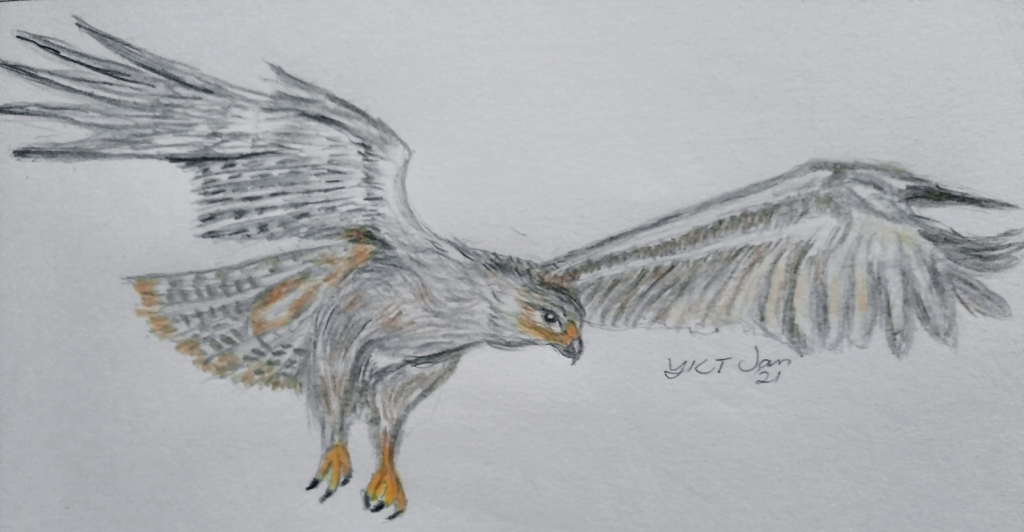Tigers Ahoy!!
“In the kingdom of the blind One-Eye is the king.” One wonders how a mother-in-law gets the sagacity to declare this simple truth. Consider the Serengeti plains. Eight million hooves trudge across Tanzania in annual migrations – prey and predator alike. At the top of the food chain are the big cats. Then after come the not-so-big cats like cheetahs and leopards. Then the bottom feeders of hyenas, vultures and finally the low end carnivorous vertebrates. In between the 1.5 million wildebeests and the half million zebras and gazelles plus some solitary species have to defend themselves, since they’re herbivorous. How? Firstly, strength in numbers – organizing their movements so that the predators require group hunting. Secondly speed – out-running chasers except cheetahs. But there’s one last trick that is not so obvious – employing a look-out. Elephants are known to hear and smell predators from afar and good if the vulnerable herds could use them. But they are not watching out for predators because of their size. Besides they have poor eyesight. In a sense the vulnerable herd live in the kingdom of the blind. Then who is the One-Eye?

It is said that the giraffe can use its height to look beyond the top of trees far into the plains, up to two kilometers. Their good eyesight helps protect their vulnerable young. This is how a Thomson gazelle called Betsy found out.
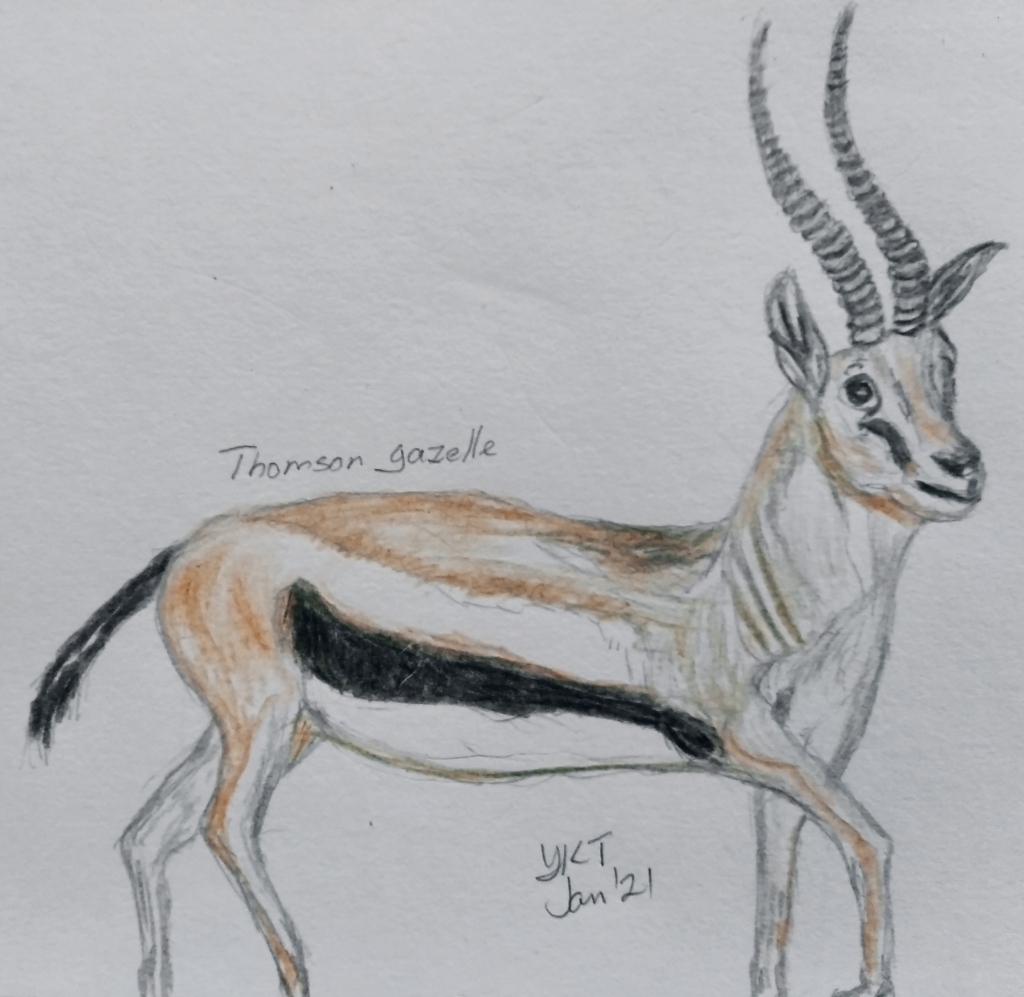
Betsy had learned to run for her life, literally. She had even successfully kicked off several cheetahs – whose speed is unrivalled in the open plains. The chances against lionesses however, depend on luck. They usually hunt in a group and even if she can outrun them, she may be ambushed when targeted. Then her luck changed – she got pregnant. However the calving period in spring allows her (and later her fawn) to hide in the bushes instead. But she still had to take precautions. That’s where her elephant friends help. She depends on the matriarch elephant. One day she noticed the matriarch was uneasy, swinging her trunk back and forth and constantly shaking her floppy ears at the newborn at her feet. Instinctively she looked around and sensed a pride of lionesses approaching. Staying near the elephants helped carried her fawn to term. Then on a warm sunny morning she felt the kicks getting stronger. Instinctively she moved towards the tall savannah. She must hide well because even a hyena will find her easy meat. Plus the smell of the discharge is bound to bring many predators. After about an hour, thankfully the newborn emerged the correct way, head first. Nobody taught her, but her licking and nudging helped the just born fawn on its feet so that it could find her bloated udders. Drink up and quickly for your survival starts now, she seemed to say. After an hour of milking, she needed to nourish herself. As she moved off the newborn knew that he must stay down and remain still. Baby deer know this through mother’s milk – danger lurks everywhere at birth. And she must move quickly in case a predator spots her she could at least draw them away from her newborn. But baby still needed a few days more to strengthen before joining the herd.
One time Betsy had just moved off to replenish her milk. The elephants were restful and it seemed that the coast was clear. As she approached the waterhole a breeze picked up. The elephants were still calm. After several sips she looked up – still no predator – but the air had a sinister silence. Then the giraffe in the opposite bank lifted up its head from the pond. It stared into the distant plain. Then turned towards its young. Turns out that the wind was blowing in the wrong direction for the elephants to sense a pride of lions.

With a swift nudge of its snout the mother pushed the young giraffe towards the savannah. “Predators approaching” – the warning went out to the others. Betsy ran towards her baby. Too late – the crouching lionesses were too near for her to hide with her fawn. She froze for a moment. Then in a moment of motherly desperation she bleated. It wasn’t a call to her baby to join her. It was a cry of danger. The lions turned away from the savannah grass where the scent of the fawn came from. Betsy deliberately walked towards the rest of the herd, away from her fawn. “Come – get me if you can!” – if only deer can talk. The ruse worked. As the leader raced towards her she jumped towards her herd, alerting the rest. The hunting melee had begun, but Betsy was confident she would outrun them. Meanwhile an ear-piercing scream bellowed from the matriarch elephant. The siren had sounded. But the commotion didn’t last long – in five minutes the lions re-grouped – the element of surprise had eluded them again.

Betsy took a while to look. The tall savannah grass all looked alike. But the nose took her right back to her shivering fawn, still subdued and quiet as ever. She gave several reassuring licks and again nudged him to his feet – milk was flowing again. So Betsy learned from this near-death experience that where there were no trees, the elephants were her only look-out, since giraffes tend to feed off young shoots at the tops of trees. But where there were giraffes at the waterholes or near the forest edges she found the One-eye king as her alarm bell. And oh, by the way there are no wild tigers in Africa, since 2 million years ago.
The mountain lion and the butterfly

Despite horror stories you hear, mountain lions are generally shy of humans. An even more shy creature is the mountain lynx (lynx raspensis) about twice the size of a large cat. His name is Dam and just turned a year this year. Like everyone else in the animal kingdom the first order of everyday business for Dam is to find food. But Dam’s problem is less than bears or wild elephants, because he doesn’t need to eat a lot for his size and small animals are plentiful in the hills where he roams. However Dam loves something more than food.
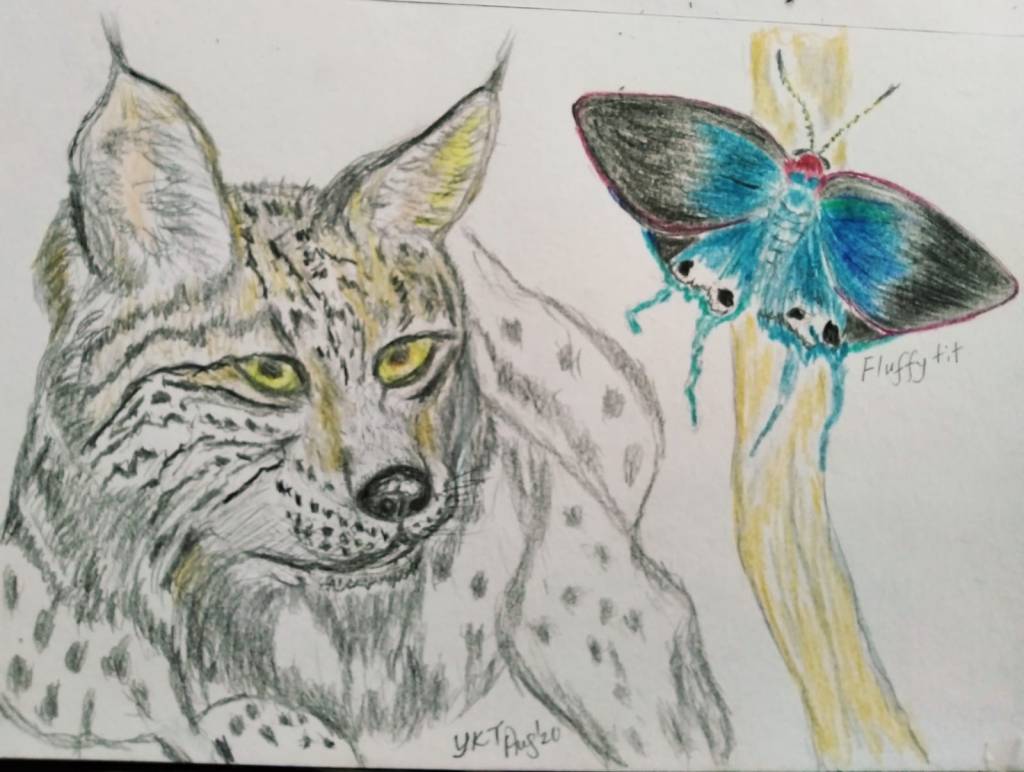
Like all cats he loves to play – especially with anything round. So after a meal he would go pick up a round fruit and shuffle it back and forth with both paws. As if not enough he would stop and stare at the butterfly on a branch. Then he would jump at it, with no intention to catch it for a meal. Sometimes he would chase a butterfly until he almost fall into a pond. As a mountain bobcat he is also naturally curious. One day he met a radiated tortoise.
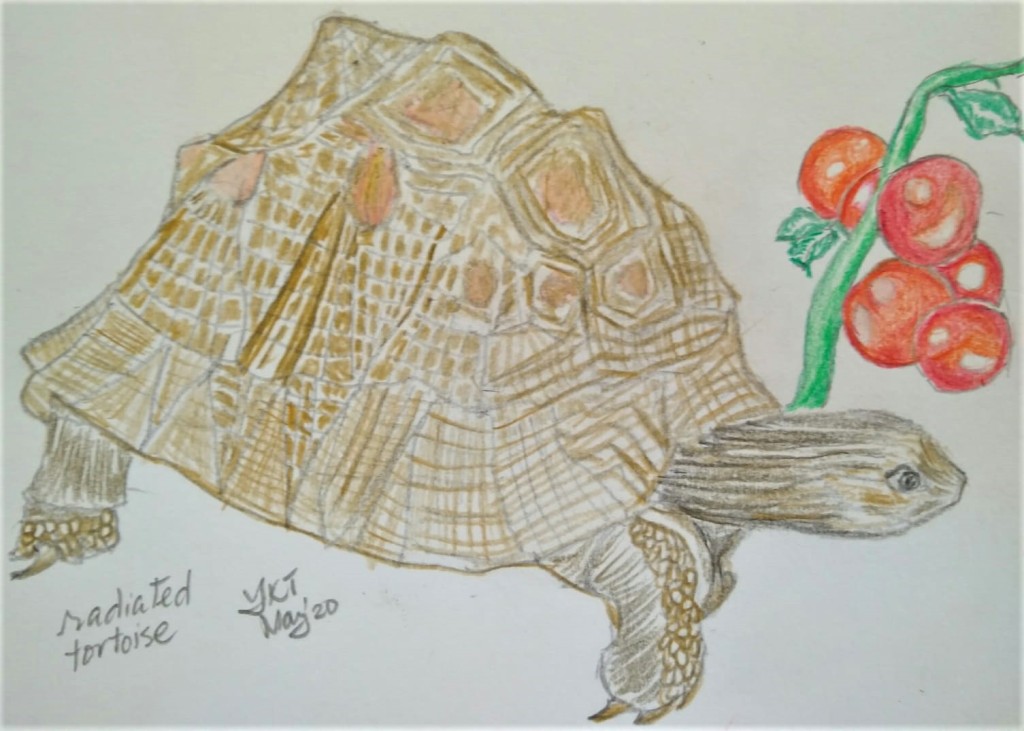
“Hey moving hill, can I play with you?” Dam asked. But every time he puts his paws on the tortoise it quickly withdrew itself and sat quietly in its shell. So Dam gave up and walked towards the pond. There he saw something that gave him an idea.
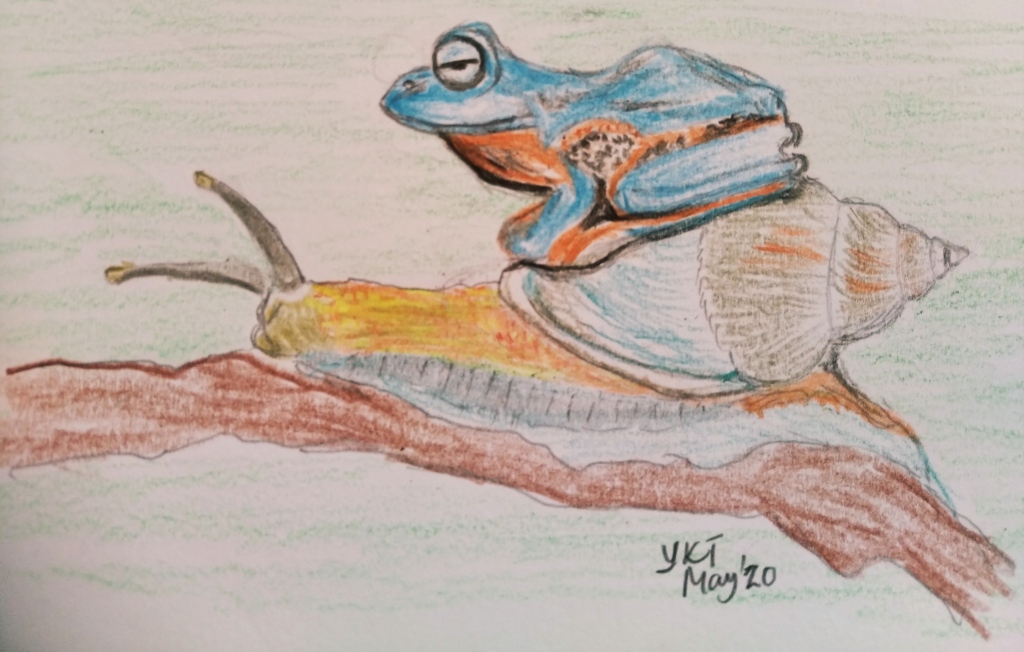
Hey this looks like fun, he thought. So Dam went back to the tortoise. But when he got on top, the tortoise would move a few steps – and stop. Too heavy he thought, and jumped off. The tortoise, relieved, looked up to a bunch of tomatoes growing in someone’s farm and trundled off towards it. That was when Dam noticed something. There were rabbits, squirrels, voles, pikas running around the periphery of the farm and birds of many kind feeding on whatever fruits that were out of reach to the others. What a feast! So Dam hung around with the tortoise but instead caught whatever he likes for a meal, while the tortoise fed on the tomatoes, lettuce and other vegetables. But he still got to enjoy playing with the butterflies, oranges and other round objects he could find. Then one day he chanced upon a bunch of butterflies trying to talk to him.
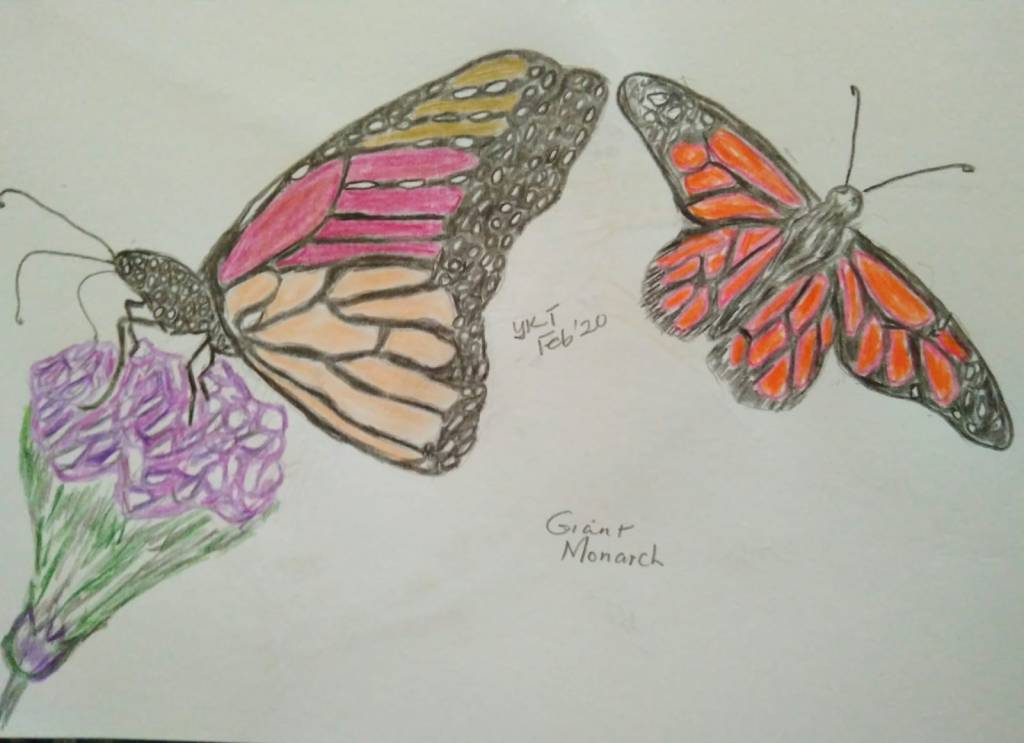
“Watch out for the owner of the farm!”, seemingly to warn him. Then one day while he was chasing a rabbit the farmer reached for his rifle. He took aim, thinking that Dam was running into his farm. Just as he was about to pull the trigger he saw the rabbit. A shot rang out but missed. Dam was confused, because he thought that he was helping to rid the farm of pests feeding on the produce. But he could not give up the chance of finding food and play on the farm. Another day and this time a small fox came around. Dam couldn’t resist the chance of a larger meal. Then out of nowhere a clutch of butterflies flew into Dam’s path as a shot rang out. The tortoise drew near to the fallen fox as Dam ran off shocked, followed by the clutch of butterflies. “I’m so sorry, I should be the one to be shot but you took it for me.” The tortoise shed a tear and trundled off into the woods, its tail pointing left and right with each step of his curved foot.

So several weeks passed. Nobody dared approach the farm. Dam was still playing with butterflies in the forest and occasionally caught a vole or rabbit. Then he saw the tortoise. It was shriveled and emaciated – except for an occasional wild root or mushroom the forest was barren. Lets go back, he said – but the tortoise was reluctant. So Dam approached the plant at the farm cautiously. It was full of luscious freshly ripe tomatoes. Gingerly, he pawed at the fruit and managed to dislodge two. A single butterfly fluttered near his ear. Then a commotion at the hut and Dam took off. A window opened and the gun barrel poked out. Quickly two shots rang out. One bullet whizzed by Dam’s ears. But he managed to reach the waiting tortoise. Slowly he dropped the tomatoes at its clawed feet and turned to go. He was limping. Then he caught the smell of another cat – a female lynx in heat. He was electrified – never felt this way before. His leg should get better. Life has been good to him.
The Eldorado Horse
The carousel merry-go-round device was invented in Paris (circa 1883) and evolved to its current state using mechanized galloping horses and other wild or imaginary animals. In 1907 Hugo Haase build the Carousel Eldorado and delighted Germans until 1911 when it was moved to Steeple-Chase Park (NY) where it stayed for 53 years. Then in 1971 the ornate figures and colorful sculptures continued to delight the Japanese public for almost 50 years. The cherubim, trumpeting nymphs, European carriages and renaissance paintings were so well preserved that many families would recall special events from their photographs. The magic was not just the 3 separate rotating stages but also the looped circus music and the tantalizing lights. At the Toshimaen entertainment park in Tokyo, customers queue for as long as 30 minutes to enjoy the two minute rides from 9 am in the Saturday morning. Then the lights would go out promptly at 8 pm. When everybody has left, in the still darkness the fantasy would begin.
First the two wild boars would boast to each other how much the customers loved to ride them. “Did you see the lady with her two children? They came back five times to ride me!”, one wild boar said to the other.
“No no no!”, said the other. “They came back to you because all the other animals were taken, including me! I have 5 different groups of schoolchildren!”
Nay, the carriage chipped in. “I can carry 5 people and all the children loved to sit me with their friends. And families too! Besides I turn faster being the inner wheel.”
What are you people squabbling about? – one horse interrupted. “Don’t you know people came to the carousel because of us? Horses gallop but you pigs only run. Ask the cherubim – he watches over us and he knows how many come and go!” Then a trumpet sounded. “What’s that for?” asked the boastful boar.
“We are the fairies who guard over all of you. Don’t you forget us because there were no accidents and dangers with our watch. Oh by the way did you notice how many people took selfies with the beautiful and naked nymphs?” Finally the cherubim spoke up.
“I am the golden one. In Spanish they call me El Dorado. I bring sparkle to the lights and cheer to the visitors and besides my magic goes into the music too. People will never forget us for these.” With that all the ladies in the paintings around the carousel poles clapped and some even cheered. Then some light bulbs began to glow softly. While all this was going on one horse was crying. The other six horses looked over. “Eh – Straight-locks what’s eating you?” one asked.
“People bring all their problems to me. They say that I am the only horse that can bring good luck, because the forelocks on my head are straight while yours are all swept to the side. One young lady poured her heart out to me because of her disease, as she might not live out the year. Another wished that her boy friend would marry her. One young man told me that if he does not pass the national exam after trying for five times he would have to end his life. Another old man cried – he said since his young wife died he was not able to find another companion and maybe he will die alone in his house. Then a little girl came to me after the sixth time trying to ride me. She just whispered to me wishing that she would not be bullied by all the boys in her school. She just wanted them to know that she has special powers now that she has ridden me. What can I do?? I’m just a wooden horse!” That was when the Angel in the center of the column spoke.
“Listen all you ministering creatures. I stand here in the middle, guarded by all the trumpeting fairies. We will always bring happiness to our visitors and I know all the misfortunes that Straight-locks face. We will change. Next week we will all transform – we will all become angels and we will really bring good to all the people who came to us.” Then Monday came around. The crowd became even bigger. The queue was so long that some had to wait nearly an hour for a 2-minute ride. Straight-locks was so happy to meet the young girl again.
Thank you very much for letting me ride you – she said excitedly after she mounted. “The boys at school were so impressed I got your magic!” As the music started and the stage started to rotate Straight-locks couldn’t feel happier. Then when she got off she gave him a kiss on the forelocks and waved goodbye vigorously. But for the rest of the day many laden with problems came and whispered their hopes on his forelocks. One middle-aged bachelor was so sad and lonely for facing life without a girl to date. Another had the opposite problem – his wife was leaving him for spending too much time at work. At 7 pm many waiting were asked politely to leave – the carousel would not be able to close on time for the long queues. Then the Tower clock at the center of the park chimed eight. Promptly the Eldorado carousel lights turned off and the engine whined to a stop – for the last time.
The next morning the wrecking crew started dismantling. Lovingly the exquisite figures of the cherubim, nymphs and paintings were removed and wrapped in protective cloth. However nobody bid to buy the horses and pigs for keepsakes. What about the dreams? Though it held the longings of a lifetime for many to them it was just a wooden horse. Along with the poles, carriages and wired bulbs they were tossed onto a truck. A slight breeze started blowing. As two men lifted Straight-locks and heaved it onto the rear one of them suddenly turned to the other. “Eh! Did you hear the neighing of that horse? Or was I just dreaming?”
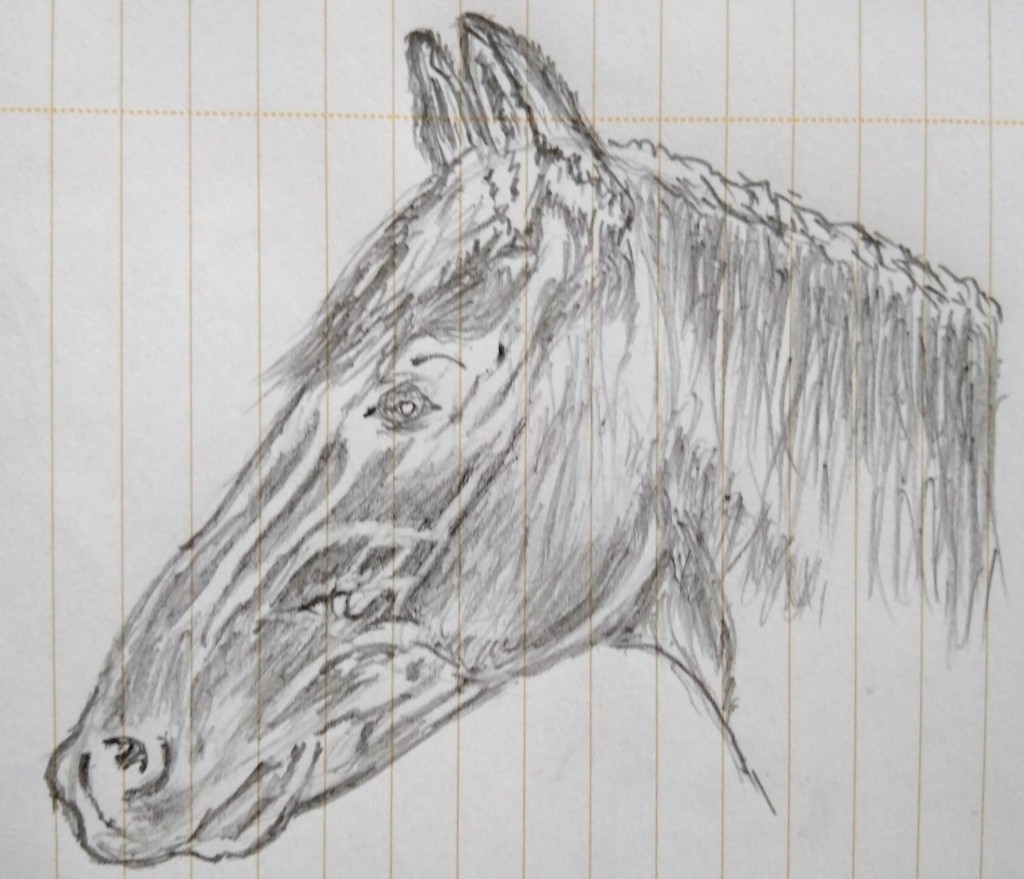
Love keeps the cold house warm
For those of us disappointed with our upbringing from our parents we could wish for an earlier abdication. What do I mean? Role reversal occurs when a child has outgrown its dependence on the parents to such a point that the parents would start depending on the child instead. This happens not only in societies where education and standard of living leapfrogs in one generation to the next but also in less privileged countries where children have more opportunities than their parents due to advancement in science and international influence. Parents likely know when is the time to give way to their children’s progress in decision making. But some may not, despite getting old. And that would hinder growth. Consider the family of the emperor penguin Pucky. She is the current single child in the family. Emperors are the largest of the penguin species (aptenodytes forsteri), with adults standing up to over a meter tall and weighing over 40kg. Because the monogamous birds hatch only one egg per season they are doting parents – taking turns to raise the chick under hazardous conditions.
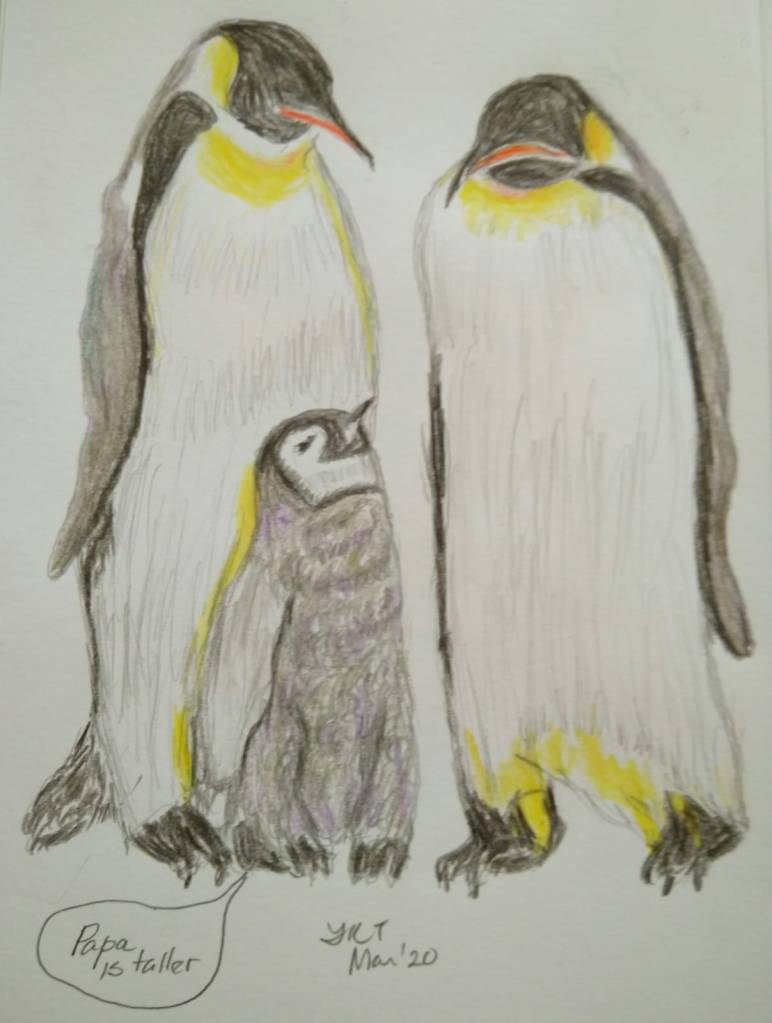
Pucky is raised secured and happy and learned all she could while dependent on her parents. Give a normal child all the love and care and they will outgrow you one day in strength and character. And so she grew confident and strong enough to be a leader. When in a troop and somebody had to decide she would be the one.
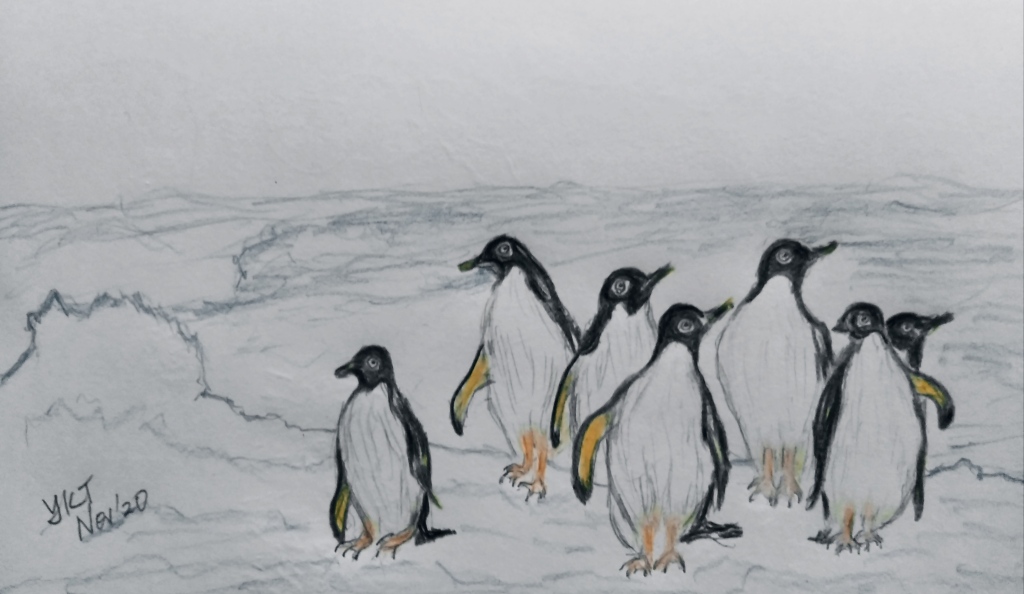
Even though she wasn’t the tallest it is her determination and steady mind that will save the day. Her parents? They follow her because they have abdicated their seniority to their steady child. Above all Pucky had one overarching responsibility – to develop an instinct for survival for her pod. The months of her growing up following her parents and others taught her the skills to escape the penguin’s most fearsome predator – the leopard seal (hydrurga leptonyx). They are the largest seal in Antarctica and is known to swim at speeds over 35 km/hr.
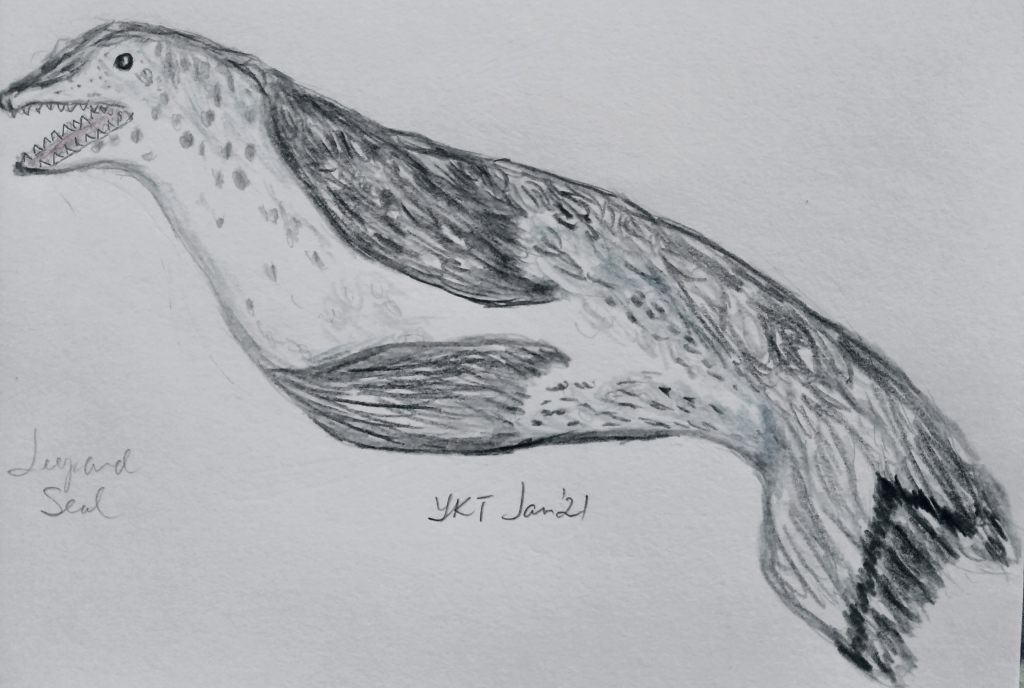
But Punky knew one fact – she runs faster on land than on water to escape. On one occasion she was leading her group out on the ice when right in their path a leopard was basking. No problem. Punky just waddled her group past the sleeping danger. But the scene would be very different in the water – a wild and risky world of orcas, seals and large sea-eagles.
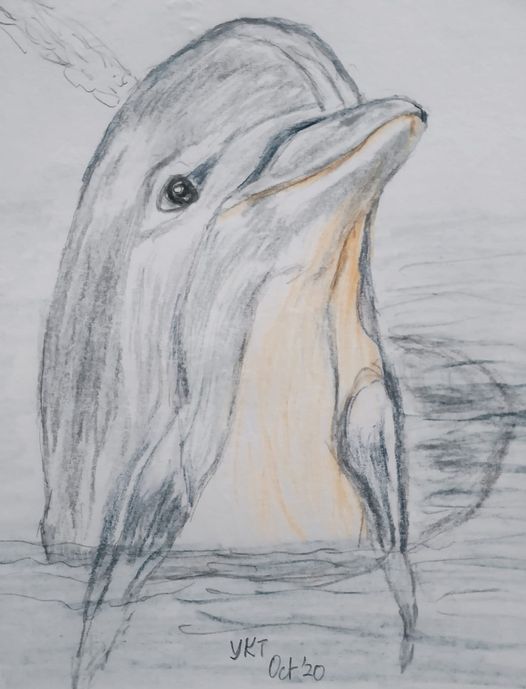
In another universe somewhere in the Atlantic a young bottle-nose dolphin called Torvy also grew up under the loving care of her parents. Like all newborns he is the only child and stuck to the mother for 5 or 6 years, learning all the tricks of getting food and above all, working with the pod. Like Punky he also became the confident leader and lived the full life in the wild. Until Man came. It happened at Dolphin Cove when a group of marine biologists decided to catch some dolphins for study. Torvy was corralled away from his pod – a stressful event for him, the pod leader. His life took a big turn compared to Punky. In the confines of the training pool Torvy was taught tricks for experimental studies. Although unnatural at first, his intelligence and confidence made him the star learner. He did too well and was leased to a marine park. Torvy became a salaried worker. Everyday he delighted crowds of young and old, splashing water and giving rides to earn his daily grub. Life was secured, longer and predictable, unlike Punky’s. In the wild Punky developed survival instincts, although life-expectancy is lower than in domesticated animals. Several months later their lives took a dramatic reversal. Again it was Man.
The marine biologists decided that the time was up to release Torvy to study his survival in the wild. Torvy was tagged and released near to a nearby pod of wild dolphins. While doing so they noticed a group of emperor penguins and decided to repeat Torvy’s experiment. Of all the ones in the pod, Punky was caught. But neither experiments succeeded. Torvy could not become a wild dolphin he once was and Punky could not be domesticated. Punky was so depressed and lonely that she would not respond to anything the scientists tried. Sometimes she would refused to eat the ready-caught fish. Full of energy, she would often swim around the aquarium pool without stopping, looking frantically for her pod. Although there were other penguins in the enclosure, Punky would not be subjugated nor subordinated. She is after all the born leader. Finally the marine biologists decided that Punky was untrainable and had to be released back to the wild. What about Torvy? Well, he was happy to be free again. But the instinct to hunt and survive was hard to repeat. For days he had been used to food given to him, much like any salaryman would not take up any new work challenges after finding a soft secured life. But the new pod he was released to did not mind Torvy tagging along in their daily routine of hunting and playing – except he is no longer a leader. Torvy had developed a lazy, retirement mindset of some humans. The only thing he enjoys these days is to jump above the water to herd shoals of fish for the other members to catch. Acquired skill for being a domesticated show-fish. Then one day while the dolphin pod was swimming in a regular hunt for krill, Torvy spotted a lone creature swimming around ahead. Punky, now released could not find her original group and has become a roaming penguin – much like a ronin or a lone samurai. But she was still herself – confident, determined and smart. Torvy broke off from the rest of the dolphins and approached Punky. He sensed an affinity – like a similar kinship of being an ex-prisoner. So the two became fast companions – Punky would search for fish and Torvy would help guard against predators like seals or sharks. If you happen to sight an unlikely pair of tagged dolphin and penguin somewhere out in the North seas just leave them be – they have been afflicted by humans before and would rather be themselves. But if you ask me I rather be the plucky penguin who remained true to form until her dying day. The only life we have is the life we’re living now.
Handsome not pretty
The business of attraction has been going on ever since creation. One wonders what did the biblical Adam saw in Eve or conversely. The instinct to garner attention between living things is either for survival (camouflaged to avoid attention), being comfortable or keeping the species. But just for looks, humans’ apparel in world fashion business in 2019 was worth $1.7 trillion. Consider the wild ducks. The male Mandarin is really the most colorful and attractive.

The female looks on and often is unimpressed. She is justified being choosy because the stakes are high. Once they become a couple and the mating ended she carries all the work. Nesting, hatching and feeding is a one-woman job. For the success of the species she’ll often lay a dozen or more eggs. It is not uncommon to see a mandarin mother leading around two dozen ducklings for food. Where’s the father? Probably chasing some other females. Then when predators attack or when the brood gets lost she gets into high gear. Ironically, at the end of their upbringing, when perhaps only a fifth of the brood would survive and leave the mother, she’ll be off again looking for another eye-catching dude. Dickie is one such dude. He’s the handsomest of the male lot. When comes time for work (which means looking for gals, solely) he gets going, moving his head up and down, popping it underwater and then out arching all the way back on his back. But for Dickie its just hard, futile work. He’ll go from one female to the next doing his head-bobbing act and the girls would just turn away and waddle off. But he just goes on trying all his might and crashing into forlorn loneliness. All summer he had been chasing skirts but failed. So when time comes to mate Dickie was still swimming around while others had their fun. Why do girls reject bobblehead? Consider another duck of a different specie.
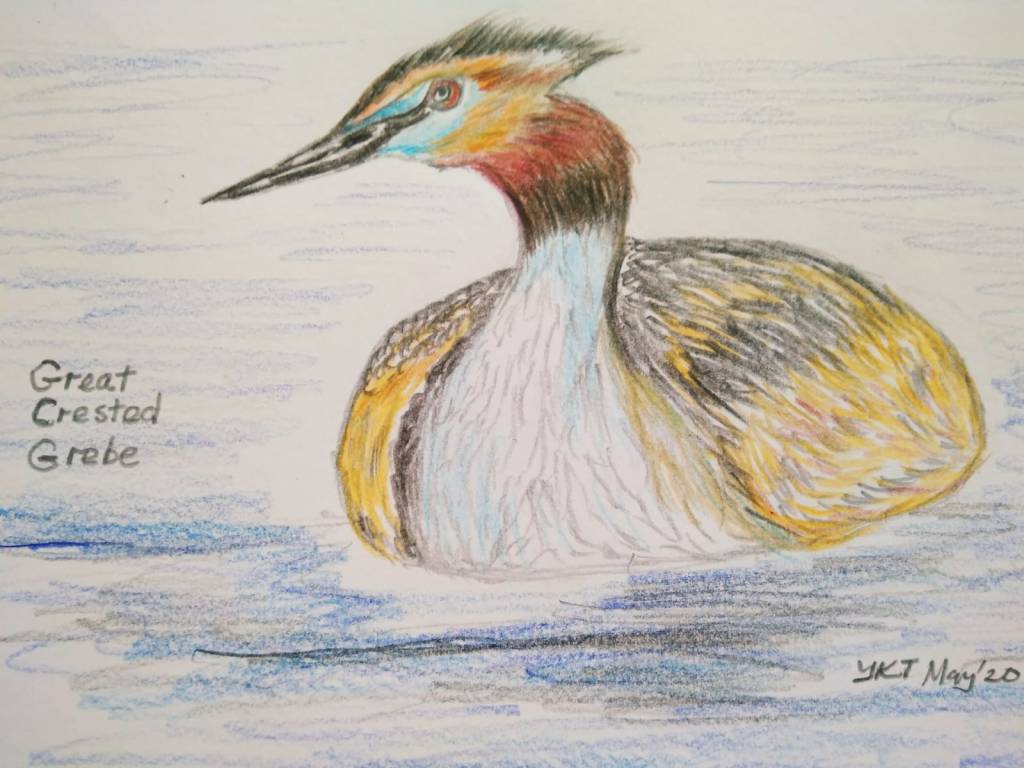
The great crested grebe are great divers unlike the mandarins, whose dive underwater only extends to its neck. Some do not classify deep divers such as grebes, mergansers or cormorants as duck but they mate too. And their splendidly colored feathers all have drop-dead sex-appeal. Don is a male grebe whose solitary hunting days end when time to raise a family. But unlike Dickie, he doesn’t chase girls. He lets them come to him. So Don would just mind his own business until a female appears for company. So he gives them time to size him up, unlike Dickie’s wolf-like behavior. Then when she appears willing Don would go into action. Species like ducks mate by the male riding the female and fertilization completes in a matter of minutes or days. Unlike the cranes or swans that mate for life, drakes lose their use for the nest-making mothers. The mothers would first house-hunt – for a home far from and inaccessible to predators. Then after hatching for days she’ll make sure the hatchlings can leave the nests safely to start the food platoon, sometimes jumping from a low-hanging tree trunk and never to return to the nests again. So that’s why Dickie never catch his mate while Don succeeds all the time! He was just too keen to be a romantic catch! Anyway lets return to the mandarin ducks in the autumn. All the females now with babies in tow would scour the waterways and flowerbeds. Feeding was to be an all-consuming activity before winter – to store up fat against the cold. But Dickie was still alone and not yet a father. One time a female duck was leading her retinue of 20 ducklings down the slope of the lake. Suddenly out of a bush a crow descended on them. They are ferocious baby eaters. The mother frantically flew to the rear to chase the crow away. But as soon as she did another crow flew to the front of her retinue and about to attack a chick. Hapless the mother duck turned but appeared too late. Then help came from an unexpected source. A loud quacking came from the back of the attacking crow and a male duck fiercely snapped at the attacker. Dickie! He became a hero for once. But was the mother thankful? No – bringing up kids is no place for men, so she chased him away.
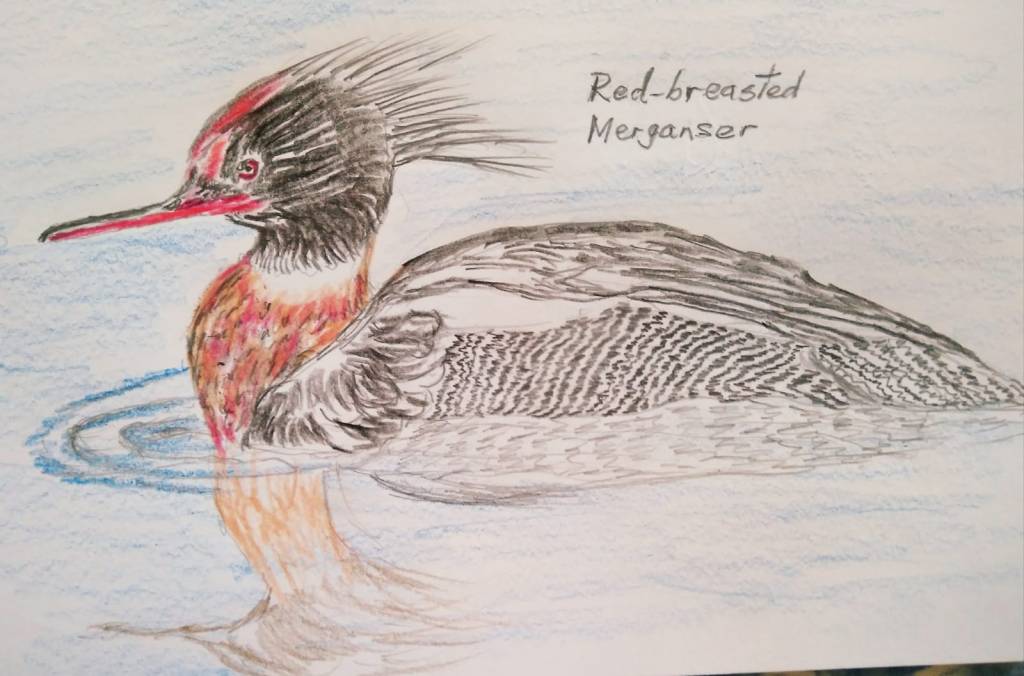
Dickie is contend to be a bachelor boy – until the day he dies. But he had at least acquired a useful new skill not usual for doting fathers – chasing crows. The other pretty boys don’t.
Winsome Partners
It seems that when one spends a lot of time with another one gets to look like each another. This goes not just for human partners but also kinship with objects for which one’s vocation calls for, or how when we start to resemble our pets. Its not always that a potter starts to look like a kettle, a cobbler like a shoe or a fruit-grower a pear. But the following tells a remarkable story how our thought processes basically mold our character, and sometimes how we look.
Charmaine loves dancing – not the social type but the artistic and the athletic. For hours she’ll go through her steps at the ballet school and then after dinner, till her bedtime. She also loves horses. When not practicing or performing she’ll be rubbing down her beloved Glen, an Arabian thoroughbred. So when she had a break she would ride him through the hills behind her house, talking to him as if a constant companion. So this went on until Charmaine had an important audition for entry to a famous ballet school in Russia. She became too busy to take care of Glen and decided to put him in a racing stable for thoroughbreds. As the weeks went on, she became busier working on her routines while Glen prepared for his first race. Then the qualifying audition. As they say misfortunes come in pairs. She failed to qualify and Glen came in second last. Well one closed door leads to another. Charmaine still loves to dance and decided to be a high school ballet assistant instructor. Then she would spend mornings riding Glen and practicing her routine for the kids. After several weeks she had the nagging feeling that she had to try harder and went back to her intensive qualifying routine. Also anyone who met her would quip jokingly that she’s starting to look like her horse, with a long face profile.
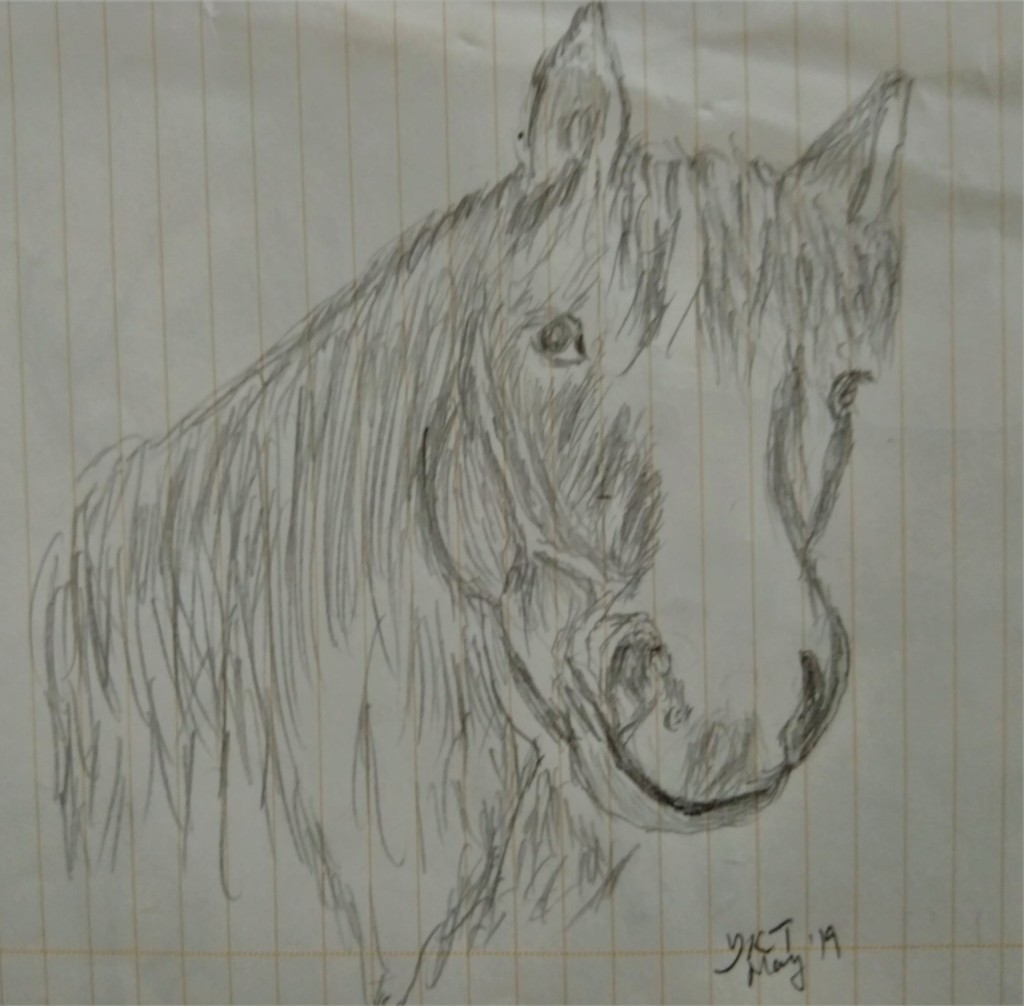
One morning she decided to go with Glen and train in the flat of the hills. As usual it was exhaustive with Glen watching on the side. Then she decided to do a grand jete – a leap that is higher than the cabriole (jump). She tried several times but felt dissatisfied. Then she did a perfect leap.
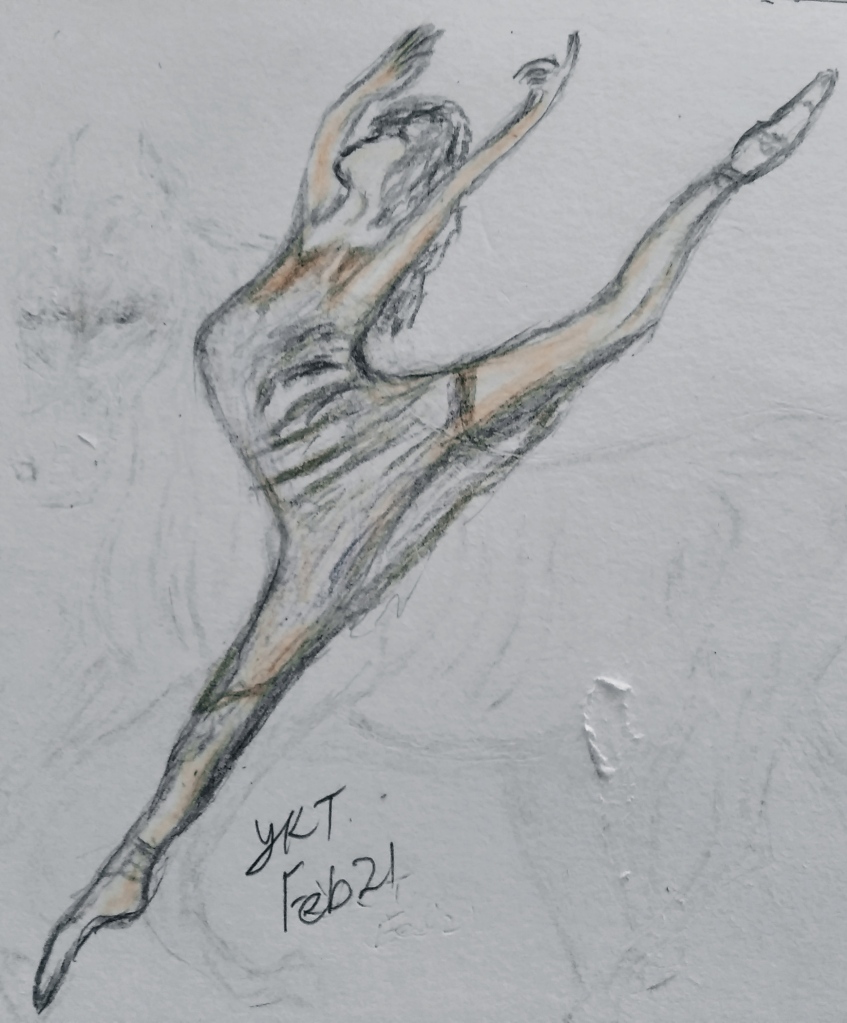
As she sat down to catch her breath what she saw next astounded her. Glen suddenly ran towards her and did a leap as well, show-horse style. She thought it might have been a record – as no horse is recorded to jump beyond 2.47 meters, and usually they do only half a meter or so. But Charmaine was impressed – went to Glen and gave him several pats on the neck and he snorted in return.

Then she looked at him thoughtfully and said, “Maybe you’ll be better at equestrian or gymkhana competition than at racing.” And so it was. Glen was entered for equestrian training while she continued to improve her ballet techniques. As expected, Glen excelled at the jump but had to work hard at dressage and impulsion. His gaits (walk, running walk, amble, pace, trot, cantor and gallop) were also excellent. But there’s one area that Glen easily beat his competitors. His control from the jump (called a bascule) is unusual. It showed up at his first equestrian show. Glen was equal to the other competitors but when the routine switches to jumping and followed by dressage he showed superior posture and control. Charmaine was a spectator as she was not a trained jockey. But she was again thinking how she could improve her own leap. She started to gain stability and posture watching her horse. Months went by and both mistress and horse started to improve in their routines. Then after the December audition the email came for Charmaine. She ran towards Glen and exclaimed excitedly, “I got into the Vaganova!”. As she hugged him with joy she started to feel the sadness of separation.
And so the paths of the pair’s lives diverged. Charmaine would constantly call the Equestrian school from St. Petersburg while working hard with the world’s best ballerinas. But they became illustrious in their training and both graduated with high honors from their schools. When it was time for them to reunite tragedy struck. At about the same time at different ends of the world. Charmaine fell during an audition while Glen stumbled at a hurdle. Both were incapacitated. She came home in a leg-cast and Glen was in straps. “Cheer up – we’ll be performing together”, she said. But she didn’t have the slightest clue what. She considered performing in a circus, but a graduate from the Vaganova academy can easily work in any theater of her choice. Then one day she found out something else. She was practicing an opera piece and as she sang, Glen responded to her singing. When she sang a spirited piece of joy, Glen would prance around, like doing a pirouette. Then when she sang a slow, sad refrain, Glen would lower his head and move it side to side in remorse. “Wow! we could perform an opera together!”, Charmaine exclaimed. And so she went looking for a theater that would take her and her horse. Luckily a theater was about to stage the Public Opera (song composed by Mauricio Sotelo, 2015) and was excited that a real horse can be used. “But can he sing?” came the question. When she replied no, they decided to use a ventriloquist. So if you ever been to a horse opera, look out for Glen. Might be a first experience seeing a live horse in the opera theater.
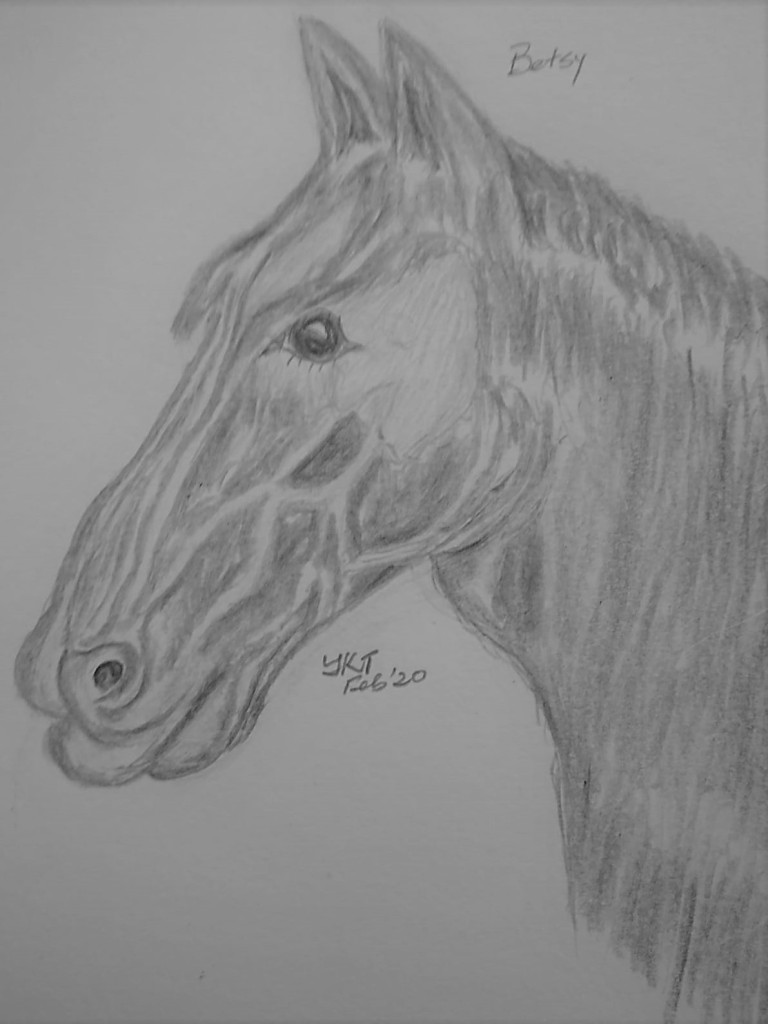
Growing to fight Champions
The first book of Samuel in the bible describes a challenge from the Philistines to the fledging Israeli nation. If Israel cannot win the contest against its champion, a giant reputed to descend from the Anakims (a parallel progeny of the human race during the time of Genesis) then all Israel will be subservient to the Philistine King. Goliath of Gath was 9.75 feet tall (or about 3 meters) and heavily armed with audacious weaponry. The taunting went on and finally fell upon a relatively minuscule David to defy the bully. Challenges to duel in the animal kingdom are not uncommon. We already heard of a story of an antelope fighting for sexual prowess in the need to preserve the species. Not too different from David’s quest is a story of the ram named Ramon.
Ramon was just a few weeks old nursing from his mother when one day a commotion arose in the flock. Climbing up the hill to face off the dominant male leader was a group of rams from a neighboring hill. They appeared bigger and tougher – even the shaggy hair on their backs were shiny black and foreboding. The alpha-male of Ramon’s flock gave out a fierce battle cry of defiance, trying to muster all the fierceness for conflict. Soon the fighting males faced each other, horns laid low and menacing. There were some skirmishes as the battle enjoined. Loud cracks could be heard as their horns clashed, sending a shiver down Ramon’s young spine. Then as suddenly as the fights started it stopped. A silence fell on the contestants. From the rear of the invading group an extraordinary ram came towards the battle-front. It looked awesome – at least twice the size of the defenders. On its head the twisted horn was bluish-black and extra long, tapering to a broken tip. The giant brandished its fearsome horns as if to advertise how many of his adversaries it had pierced and killed. It had long brownish-black flowing mane, long shaggy beard and whiskers that bristled in the sunlight. As he approached the defending male the rest of his gang parted to let the champion forth. The alpha male made a brave attempt to defend his pride and harem. It was no match. Before he could even come forward the champion easily pushed him downhill. The rest of the defenders won’t even put up a fight. The spoils of victory were quickly claimed. The invaders took away several doe, including Ramon’s nursing mom, before returning to their hill.
So Ramon had to feed off surrogated milk, often not enough for the rest of the young, ever since the lactating females were taken from them. Again the bullying troop would occasionally return and handily invade their pastures to strip bare their fields. Any attempt to resist in defense would elicit an overpowering response from the rogue champion and everyone submitted to the bullying. Several months passed and Ramon grew. But because good grass was scarce he was skinny but ruddy. So one day he approached the sidelined alpha-male why the flock had to give in to the bullies from the next hill each time. “We are waiting for someone to deliver us. Their monstrous giant takes everything from us. Who can stand up to him?” Ramon was silent. Thoughtfully, he walked to the rest and lowered his head. “We will take back our fields, our kids, our families!” They all bleated in unison, as if to say: “Who are you? Are you bigger and stronger than that giant?” Ramon became even more resolute. From that day on, Ramon would run and train himself up and down the slopes of the stream, chasing anything to strengthen his limbs and stamina. “I will be him!”, thinking again the alpha-male’s question. I just need to be fast and light.
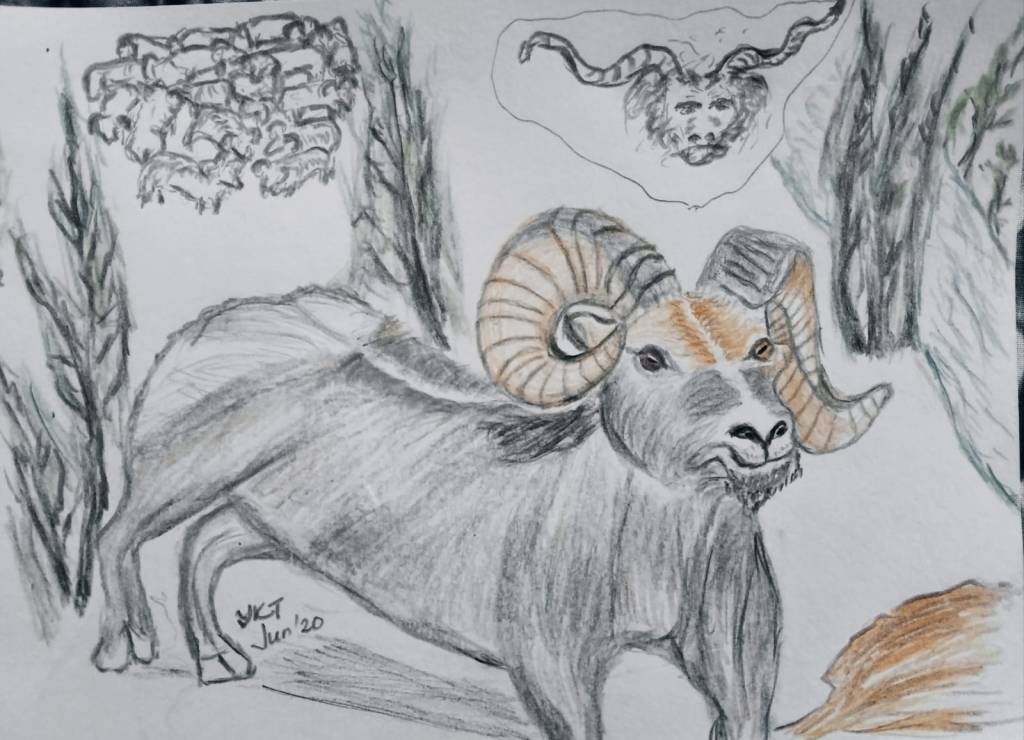
Several more months. Their grass grew again, being more succulent because of the stream compared to the barren bully flock’s. One cloudy day they came. One by one the invading army strode up the hill, expecting to just eat any grass in their path. As they did each invader walked with such disdain for the cowering flock at the hilltop. As the first reached the top alpha-male wasn’t there. Instead a ruddy runt of a ram confronted them. Before he could lower his head Ramon ran and rammed the first down the hill, sending him rolling towards the foot of the champion. “Who is this minion who dares stand against me?” When he saw Ramon, he sneered at his skinny adversary. As if mocking in laughter he advanced, wicked horns flailing. Ramon retreated, but did not turn his back. He merely wanted to give the brute more space to charge. The giant brute stopped, lowered his head and appeared to scream, “Prepared to die!!!” Then at bullish speed it raced towards Ramon who stood still in front of a small bush. Just as the wicked horns reach Ramon, he leapt up sideways. The heavy monstrous ram couldn’t stop. It plowed towards the bush. Beyond it is a steep slope towards the stream. Caught in the bush, the bully thought he could turn and finish Ramon off. But Ramon was ready, waiting for this moment. He lowered his horns and rammed as hard as his could on its rear. He had chosen the bush because beyond it at the end of the steep slope were several sharp pointed rocks. Everyone was stunned as the heavy animal rolled clumsily towards the rocks. One by one the invading rams glanced down at their champion impaled, groaning and kicking in dying anguish. Then one at a time they retreated down the hill, some with an imaginary tail between their hinds.
Ramon, you are our champion now, the alpha-male seemed to say. But Ramon would rather not be. He is after all the runt of the flock. Maybe from now on our males would grow up strong to produce a champion. For Ramon, he just wants to run and race through the water streams. God had called me to beat a champion, not to become one.
Luck would be hers – the happy goat
Goats are not very high on the list in our respect for animals. When one refers to a scapegoat one thinks of any easy way to lay our guilt, a tradition from early biblical times. In 2016 more than 450 million were slaughtered for mutton, about 1.2 million a day. In poorer countries they are an easy source of income, because they are hardy and will survive on mountainous terrain and eating most vegetation. They also reproduce well. One such lovely kid is Elly. So cute and cuddly was she that the farmer decided she should remain as the daughter’s favorite pet. That’s Elly first lucky break.

Elly and Elmo her brother would run daily up and down the hills together with the flock of 200 goats. They know every Himalayan plants, shrubs and herbs in the mountains by their smell and sometimes eat them for herbs. So one day a foreign Himalaya trekker came to rest at their farmhouse and Elly and Elmo came running with some vegetation in their mouths. The trekker casually took some that had fallen on the ground, took a sniff at it and stared in wonderment. He turned out to be a famous herbalist. Quickly he stood up, took his cellphone and called his colleague in Switzerland. “Hey I think I found some nag chhatri (trillium govanianum)” Turns out that this rare medicinal specie had almost gone extinct when exploited by foreign herb-hunters. He quickly asked the farmer for his contacts and went on his way. Some months later the trekker returned to the Himalayas with his colleagues on an unofficial field trip. Elly, now fully grown is still running around, though not as cute to be a pet anymore. “Where’s your other goat?” he asked the farmer. “He’s the male and we’re shipping a male flock to the abattoirs today”, was the reply. Elly was saved a second time, since all female goats were kept for milk. Please can I buy your goat the trekker pleaded, because he knew that Elmo and Eddy are probably the only animals who can search for the rare herbs. And so the happy pair were reunited to roam the Himalayans, but not for long. The trekker took Elmo on the field trip and started training him to sniff out the nag chhatri using the specimen he picked up at the last trip. But it wasn’t a rewarding mission and they returned to the farm that day empty-handed. Elly greeted her brother joyfully.

Then the trekker noticed another herb in her smiley mouth and gently pulled it out to examine it. Again he stared at it in wonder after a quick sniff. But he need not call his friend who was standing next to him. “It is cordyceps sinensis or Keeda Jadi as the locals call it.” Turns out that this time they found the Himalayan Viagra. Besides potency, it is known to cure several other ailments such as fatigue and has been tried as a cancer abatement drug. So he called the impoverish farmer again and offered $100 for Elly. The farmer gladly accepted and turned to Elly “You lucky goat – I’m down to my last 50 rupees and you just saved yourself from being sold.” Elly did nothing but smiled.
And so the lucky Elly and her brother went out to the foothills the next day with the herbalists to hunt for endangered species. That was when they realized that Elly was the one with the herb-scenting nose, while Elmo merely tacks alongside her to eat them. Elly found some more nag chhatri plants and the researchers carefully marked the spots secretly. These days rogue hunters will kill for the lucrative species trade. For two weeks they marked many spots of other uncommon species worth noting, but no Viagra. Then it was time for the researchers to go home. They decided to ship Elly back to Switzerland where some rare herbs needed to be found. Elmo? Well the Swiss laws are very strict to admit foreign livestock, but they managed to make a special case for the special Elly and Elmo had to be left to the farmer. “Here, please take care of Elmo” the researcher said to the farmer and gave him all the US dollars change he had before departure. The farmer gave a wry smile.
So Elly the smiley became a celebrity herb-hunting goat in the Swiss Alps. She’s also the luckiest and happiest goat alive. But you can guess what happened to Elmo. The impoverished farmer probably shipped him to the abattoir for a neat additional income. Maybe to you mutton lovers, Itadakimasu!! Literally it means grateful to accept the sacrifice of something’s life.
Bombs away at reservoir bridge
If you, an irregular jogger like me have ever been attacked from the air count it lucky as it could be worse. At a reservoir there lives a colony of gulls. They make their nests along the coast and daily fly out to the sea for food. And so attacks from the air are common for intruders. But the gulls have a more serious threat. Roving around are crows and eggs or nestlings are their favorite lunch. Corvids is a collective noun for crows, ravens, rooks, jackdaws, jays, magpies, treepies, choughs, and nutcrackers. Ravens can grow as big as a cockerel and crows are the size of pigeons. So that day when I had a light scratch at the back of my head I decided to explore their habitat. You’ll see nests between rock crevices and the parents emerging after feeding their young with voracious appetites. Then a hideous “caw caw” announced the arrival of the scavengers. Their modus operandi is to wait for the parents to emerge, then swop in to catch whatever’s at home. As I stared at them a band of doves flew overhead which I barely noticed. Until I suddenly felt something wet on my head.


Of all the places to poop! Must be an accident I thought as I washed my hair out. When I returned from the washroom the crows had gathered at the bridge. That must be a good spot to spy on who’s leaving home. Then the attack. A flock of gulls flew towards the crows and you can even hear the barrage of yellowish brown discharge dropping on the scavengers. It really was an aerial bombardment because the crows were taken by surprise with nowhere to hide. Quickly they returned to their roosts in the trees, preening themselves of the offensive excrement. But the war had not yet ended.

The crows were determined and boisterous as ever re-gathered. But never underestimate a colony of defensive gulls. Without warning a band of gulls flew straight from the sky and dive-bombed the unruly mob. This time it was no excrement, but the snapping beaks that hit them. The scavengers scattered. But we know they would soon return. But would they? A few months later again when I went jogging at reservoir bridge I had another reception. Something large scratched my shoulder from the back this time. I looked back and caught a glimpse it it – a large bird of prey. It circled and went to a spot in the tall Acacia tree. There were two of them. It looked like they were a couple about to start a family. Neither gulls nor crows can be seen. And the territory was taken. Objectors become easy lunch.
